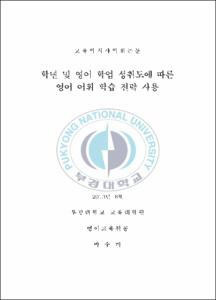학년 및 영어 학업 성취도에 따른 영어 어휘 학습 전략 사용
- Abstract
- For years there has been a shift from an emphasis on repetition, memorization and drilling to an emphasis on speaking and listening. This is due to the growing importance of communicative competence in English language learning. This change, however, has brought worries that this learning style would keep students from learning other essential elements in English, such as grammar, pronunciation, and especially vocabulary. Numerous studies argue that vocabulary itself plays a crucial role in second language learning. Based on these general findings, this study investigated English vocabulary learning strategies by grade and achievement level.
To achieve the goal of this study, the following research questions were examined: (1) What strategies do high school students use and how often do they use them? (2) Are there any differences between grade one and two students' use of vocabulary learning strategies when they are studying vocabulary? (3) Are there any connections between vocabulary strategy use and vocabulary achievement as measured on vocabulary tests?
For this study, students were informed of the vocabulary tests and survey. For assessment of the students’ vocabulary proficiency, a 30-question vocabulary test was given. Students had ten minutes to complete the test. In addition, to show what strategies the students use when they encountered a new word, a 22 question survey was given within five minutes of the completion of the vocabulary test.
The results of this study are as follows. First, to find the meaning of a new word, students relied heavily on using a bilingual dictionary, guessing from textual context, and ignoring strategies. The strategies they used to consolidate the new word included writing a word continually, self-testing, and visualization. Furthermore, they used strategies such as listening to movies, TV shows, and music to activate the new words. Second, there are few differences in the use of strategies between grade one and grade two students' vocabulary learning. Lastly, higher-proficiency students were found to use a wider range of vocabulary learning strategies than lower-proficiency students. The higher-proficiency students showed that they use the strategies of ignoring, using a bilingual dictionary, thinking about synonyms and antonyms, visualization, and self-testing.
From the findings, it is clear that teachers should encourage students to use a variety of learning strategies when they learn vocabulary. Moreover, to boost lower-proficiency students’ use of vocabulary learning strategies, teachers need to not only teach the strategies themselves but also build motivation for studying by encouraging interest in English language learning.
- Issued Date
- 2013
- Awarded Date
- 2013. 8
- Type
- Dissertation
- Publisher
- 부경대학교
- Affiliation
- 교육대학원
- Department
- 교육대학원 영어교육전공
- Advisor
- 오준일
- Table Of Contents
- Ⅰ. 서 론 1
1.1 연구의 필요성과 목적 1
1.2 연구 과제 3
1.3 연구의 제한점 3
Ⅱ. 이론적 배경 및 선행연구 4
2.1 어휘 4
2.1.1 어휘의 중요성 4
2.1.2 어휘지식의 정의 5
2.1.3 어휘학습방법 6
2.2 어휘학습전략 8
2.2.1 학습전략의 정의와 분류 8
2.2.2 어휘학습전략의 정의와 분류 13
2.2.2.1 의미발견전략의 분류와 특징 17
2.2.2.2 기억강화전략의 분류와 특징 20
2.2.3 어휘학습전략의 효과 27
Ⅲ. 연구 방법 30
3.1 연구 대상 30
3.2 연구 도구 31
3.2.1 어휘능력 평가지 31
3.2.2 어휘전략 설문지 33
3.3 자료 수집방법 및 분석방법 34
Ⅳ. 결과 및 논의 35
4.1 설문지 및 어휘평가지 신뢰도 분석 35
4.2 고등학생 어휘학습전략 사용 36
4.3 학년에 따른 어휘학습전략사용비교 39
4.4 영어성취도에 따른 어휘학습전략사용 비교 42
Ⅴ. 결론 및 제언 47
5.1 결론 47
5.2 제언 49
참고문헌 52
부록 58
- Degree
- Master
- Files in This Item:
-
-
Download
 학년 및 영어 학업 성취도에 따른 영어 어휘 학습 전략 사용.pdf
기타 데이터 / 4.82 MB / Adobe PDF
학년 및 영어 학업 성취도에 따른 영어 어휘 학습 전략 사용.pdf
기타 데이터 / 4.82 MB / Adobe PDF
-
Items in Repository are protected by copyright, with all rights reserved, unless otherwise indicated.